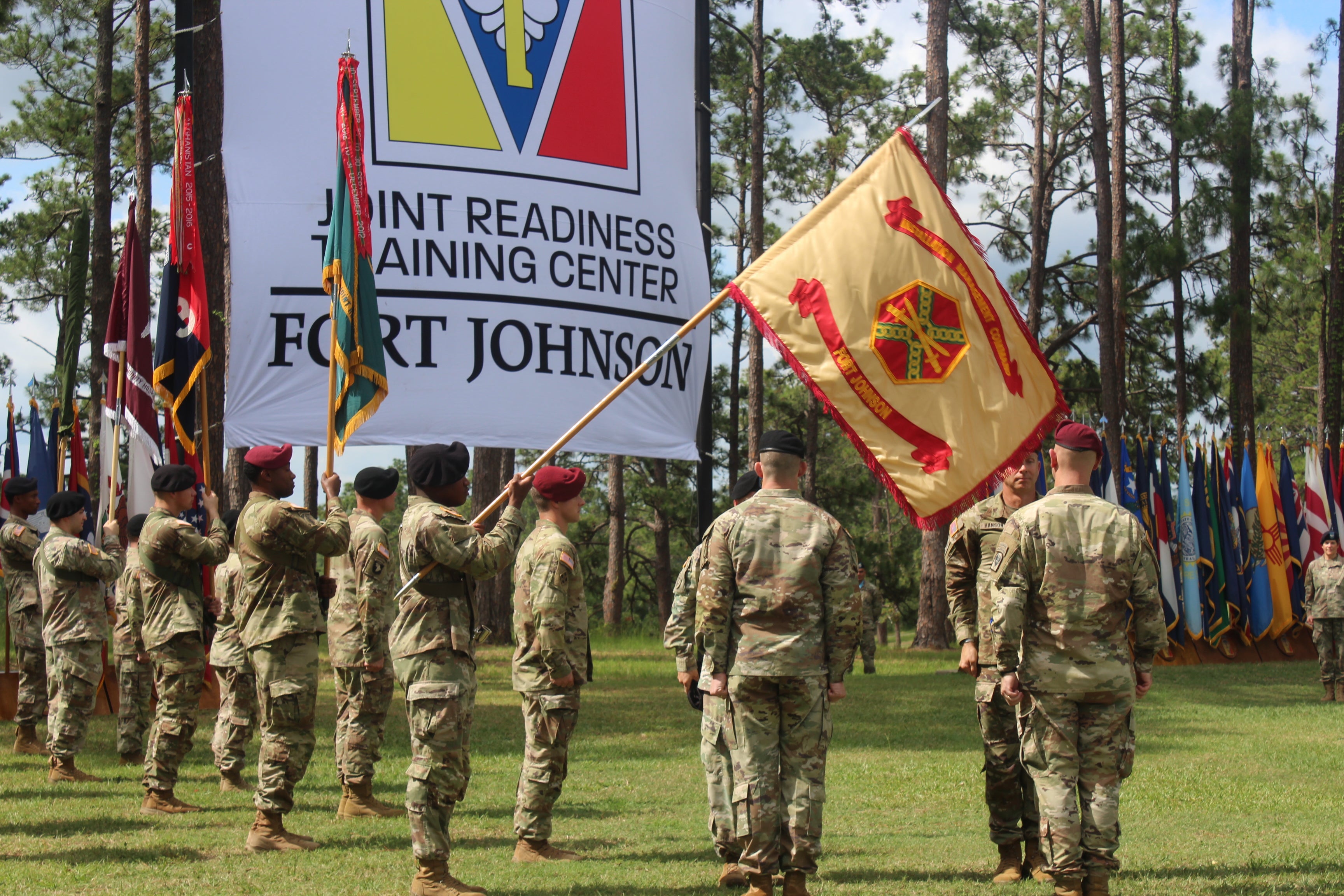UPDATE: Fort Johnson’s namesake decorated World War I veteran who embodied ‘warrior spirit’
Published 4:06 pm Tuesday, June 13, 2023
On the grass of Warrior Field Tuesday morning, America’s Premier Combat Training Center was renamed to honor Sgt. William Henry Johnson, a decorated World War 1 veteran who embodied the warrior spirit.
The redesignation of the Leesville base — which houses the Army Joint Readiness Training Center — from Fort Polk to Fort Johnson is a result of changes mandated by Congress through the 2021 National Defense Authorization Act.
As a result of the act, all Army bases identified by Congress as having Confederacy ties to their names are required to change the bases’ names. Fort Polk was included, as it was named after Confederate general and slave-owner Leonidas Polk.
In May of 2022, after accepting public comment, Congress announced the decision to rename the Training Center to Fort Johson, honoring Sgt. Johnson, a North Carolina native who served in the Army during World War 1.
Johnson was a member of the 369th Infantry Regiment, the all-Black New York National Guard regiment known as the Harlem Hellfighters.
He and his regiment were dispatched to front line combat in 1918, and were some of the first American soldiers to be positioned.
“Most American soldiers were yet to arrive in Europe, as the nation struggled through the logistics of training, equipping and deploying an army of 4 million,” said Brigadier Gen. David W. Gardner, commanding general for JRTC and Fort Johnson, during the ceremony.
The army that Sgt. Johson enlisted in was segregated, and was shipped out months before the United States soldiers. Upon arrival, they were attached to the French army.
In the early morning of May 14, 1918, German soldiers attacked his position.
“Facing a fierce enemy, wounded and without support, Johson could have surrendered, but chose to fight.”
He pushed the raiders back (and rescued his friend from capture) by exhausting all his ammunition, eventually relying solely on his bolo knife. By the end of the fight, he had killed at least four German soldiers and wounded about two dozen more.
At the time, he was 26 years old, 5-foot-4 inches and 130 pounds.
He sustained 21 wounds.
Gardner said Johnson was the first American hero of World War I.
After this victory, and one tour of duty to the western edge of the Argonne Forest in France’s Champagne Region, Johnson was awarded the French Croix de Guerre avec Palme, France’s highest award for valor. He was one of the first Americans to receive this honor.
When he returned home, he was celebrated during a parade in New York City.
Despite his honors, the instituted racial segregation and disenfranchisement in America during the first half of the 20th century caused Johnson’s bravery to become brushed aside.
“There was no vehicle that would allow him to be honored,” said his granddaughter, Tara Johnson.
“I think it is so important for families that are aware of such heroic actions that might have been overlooked previously, and their ability to fight for that and continue to bring this forward,” said Gen. Daniel R. Hokanson, U.S. Army four-star general and 29th chief of the National Guard Bureau. “In cases like that where history may have lost that somewhere, it is important for the families to continue to advocate for the right thing, and the right thing did happen.”
Johnson’s injuries affected him throughout the rest of his life, and after returning home he was unable to maintain a civilian job.
He died a decade later in July of 1929.
Thanks to his family’s persistence, he was posthumously awarded the Purple Heart in 1996 and the Distinguished Service Cross in 2002. On June 2, 2015, then-President Barack Obama posthumously awarded Johnson the Medal of honor.
Tara Johnson said she was content with this level of honor.
“We thought once we fought so hard to get the Congressional Medal of Honor, that we had done our job. We were going to celebrate him as a family quietly.”
She and her family did not expect their efforts would continue to echo.
Hokanson said the naming commission was well aware of their persistence to get Johnson appropriately honored.
“All along, they knew that his heroism needed to be recognized at the national level,” Hokanson said.
“Now they have transcended to looking at his service, and not the color of his skin,” Tara Johnson said. “Who can not be happy about that?”
She said her grandfather’s pride in his service was separated from his race, especially when he was recognized in the New York City parade.
“He didn’t look at it as ‘I’m the first African-American guy sitting on this car, waving and people cheering him on,’ ” she said. “He looked at himself as a soldier, and nothing more than that, and he was honored to do that.”
Tara Johnson, as well as officials present at the ceremony, believe that a training facility being redesignated in the name of Johnson was a thoughtful decision.
“Here he is, an ordinary man that never got recognized until recently, and it was his service and his training that helped him get that recognition. So what is a better fitting place than a training facility?” she said.
Hokanson said it is“hugely significant.”
“He was a citizen, he became a soldier. At the end of the day we are here to defend our country, defend our citizens and when you have examples like that in history, it just inspires you to want to do more, be better and make a difference.”
He said soldiers who come to Fort Johnson to train face one of the most complex training environments.
“From the youngest private to our brigade commanders and command sergeant majors, every single one is tested here,” he explained. “They fight a very strong adversary … and it really causes them to dig deep and really get good at what they do.”
Gardner said Johnson embodied the base’s motto: Foraging the warrior spirit.
He said that at its core, the warrior spirit is “fueled by a deep sense of purpose.”
“At the heart of the warrior spirit lies courage, the unwavering bravery to face danger head on, to stand firm in the face of adversity and to protect the freedoms we hold dear,” he said. “If Sgt. William Henry Johnson doesn’t exemplify the warrior spirit in its purest form, then I don’t know who does.”
He noted that the history of service was not isolated to Johnson, but instead has spanned 105 years through his lineage. Many of Johnson’s family members went on to serve. Tara’s father, for example, carried on that spirit. He served as a Tuskegee Airman — a group of African American military fighter and bomber pilots — in World War II.
Fort Johnson is being redesignated alongside eight other bases, including: Fort Benning and Fort Gordon in Georgia, Fort Bragg in North Carolina, Fort A.P. Hill, Fort Lee and Fort Pickett in Virginia, Fort Rucker in Alabama and Fort Hood in Texas.






